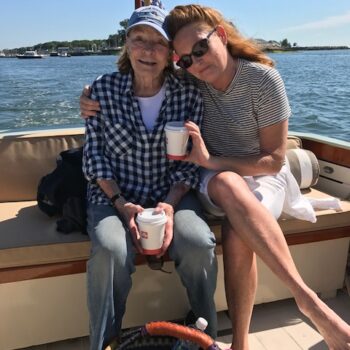Hillary Kennedy

Something I ask my children, clients and friends who are going through difficult situations is the following: Where do you want to be parenthetically when it’s over? You may not know when “over” is, but reflect on where you want to be standing. Do you want to be the person whose hair is falling out, who’s overweight, can’t take breaths and is drinking too much? Being most concerned about the patient while neglecting your own care will lead you down this path.
March 12th, 2018
Hillary Kennedy is a caregiver to her mother, Jean, who has Alzheimer’s disease.
The most difficult part of Alzheimer’s is trying to differentiate whether behaviors come from the disease or the person. I learned that I needed to develop a new level of tolerance for my mother. Her cruel words towards me were painful at first, but I now know these came from the disease, not from her. My mother was a talented interior designer who had extensive knowledge of English antiques and decorative accessories. Now, she doesn’t believe me when I tell her she’s wearing her own coat. Earlier this year, we put my mother in a care home. When I visit my mother there, I observe other adult children with their parents and see the same look on their faces: a mostly empty stare that includes flashes of disbelief, anguish, rage and acceptance.
Although self-care may sound like a term that has been coined by young people, it’s not. I am fortunate enough to work at the Essex Wellness Center, where I teach Pilates and other classes. They also host workshops and support groups for people going through difficult situations. My position at this all-women company has empowered me and taught me a lot about the importance of self-care, including exercise and forgiveness.
Any form of exercise is important. Go for a walk or roll around on your living room floor; just make sure that you’re mindfully exercising. I believe Tai Chi is the best exercise Alzheimer’s patients can do. It moves slowly and can be done from a chair. People who are experiencing cognitive decline may have difficulty following directions, but it may be easier for them to focus while seated. If you move your arm in a circular motion in one direction, but they move their arm in the opposite direction, it won’t matter because they are still moving, as well as participating in exercise that is holistic and purposeful.
In addition to trying to care for my mother, I have a husband and three children, so I wear a lot of hats. When the difficult decision to put my mother into a care home came up, I asked my coworker what she thought. She told me that during the two years she’s known me, it has always been about my mother and asked when I planned on making it about me. Her comment brought tears to my eyes. She gave me permission to care for myself too. Try to do the same. Remember that most guilt comes from society. However, as long as you know you’re a good person, you should not feel guilty for taking care of yourself. Go with what your gut tells you when caring for your loved one. The rest of the world hasn’t shared your experience, so go with what’s best for you. For me, self-care is getting enough sleep, eating well, meditating, exercising and trying acupuncture or getting massages. Also, joining a support group has helped me a lot because there is a lot of compassion in the room when people speak, which can be powerful.
Something I ask my children, clients and friends who are going through difficult situations is the following: Where do you want to be when it’s over? You may not know when “over” is, but reflect on where you want to be standing. Do you want to be the person whose hair is falling out, who’s overweight, can’t take breaths and is drinking too much? Being most concerned about the patient while neglecting your own care will lead you down this path. Occasionally the “guilt monster” may creep in, but remember that it is not selfish to take care of yourself and in doing so, you will help your loved one too. Some days it may be difficult for you to get out of bed, and that’s OK. If you feel emotionally drained from what you are going through, give yourself permission to stay in at times.
I’m not suggesting that making time for self-care is easy or that this experience is simple because this disease is vicious, and everything I’ve experienced is horrific. However, if you’re an empty barrel who is so stressed there is nothing left within you, what good are you to your loved ones?